RIYADH: Honey has long held a special place in Saudi culture, cultivated by beekeepers across the region for its medicinal and culinary uses. Now, with added government support, its true economic potential and environmental benefits are being realized.
Last year, more than 100 licenses were granted to beekeepers to produce this liquid gold on land administered by the Imam Abdulaziz bin Mohammed Royal Reserve Development Authority, predominantly in the Rawdat Khuraim oasis.
Here, beekeepers have been producing the finest types of natural honey, such as Najdi acacia honey, spring flower honey, wild sidr, salam honey, and shafalah — boosting the local economy with sales of highly prized products.

Aside from honey, the other products of bees are beeswax and natural substances that have several uses, such as making sealants, lubricants, construction material and medications. (Supplied)
“Natural honey is a product that is in high demand in the Kingdom,” a spokesperson for the authority told Arab News. “At the reserve, we have natural pastures characterized by honey plants, ensuring that the breeder obtains sufficient nectar to produce honey.”
Saudi Arabia is immensely proud of its honeymaking heritage, attested by events like the Jazan Honey Festival and the Honey and Agricultural Products Festival in the Tabuk region, and weekly auctions in Taif to sell honey and other bee products.
To promote the ancient craft of beekeeping, the reserve recently hosted an integrated “bee basics” training program, offering a new generation the opportunity to earn qualifications and practical experience in honey making.
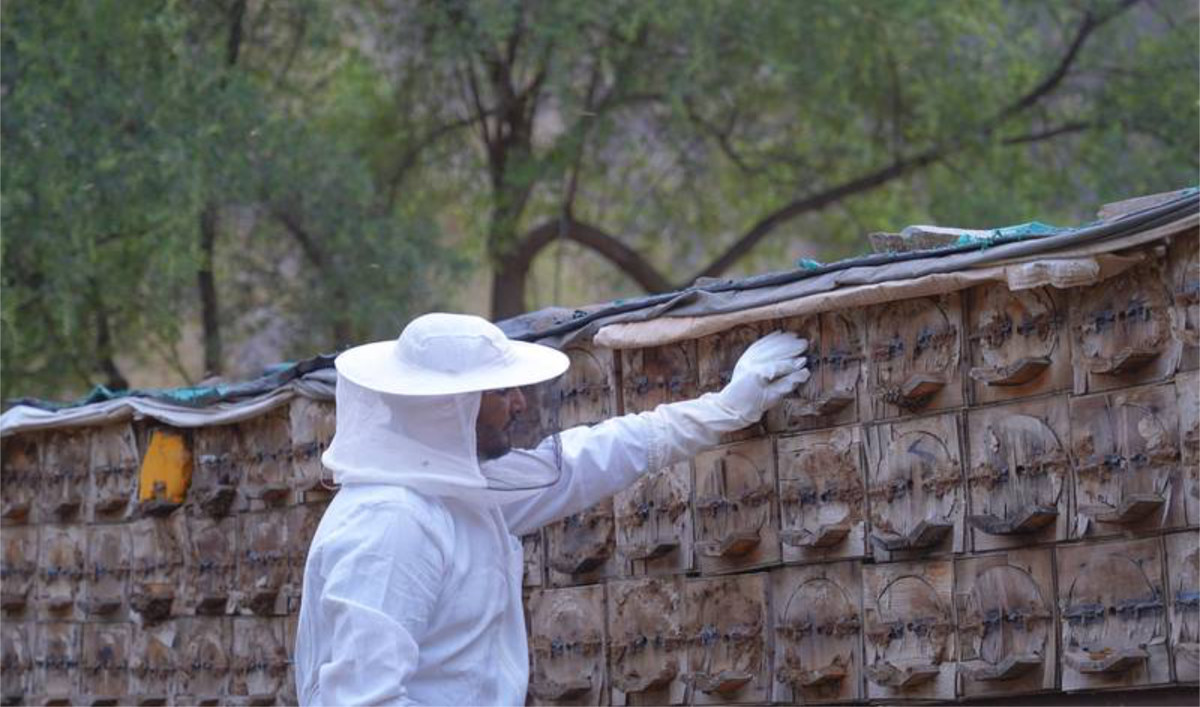
Honeybees in the higher reaches of Saudi Arabia are drawing crowds and making the native juniper-covered Soudah mountains one of the most interesting models for sustainable tourism in the Middle East. (Supplied)
“Now, the trainees have finished the program and the next honey harvest season will allow us to see the fruits of the program’s labor,” the spokesperson added.
Honey production is one of the most beneficial activities for supporting local plant species and agricultural crops. Bees are pollinating insects. As they visit plants seeking nectar, pollen catches on their bodies and passes between plants, thereby fertilizing them.
DID YOUKNOW?
• Bees play a crucial role in pollinating date palms, a popular and profitable agricultural crop in the region.
• Beekeepers often move their hives to date palm orchards when in bloom to enhance pollination and increase fruit yield.
• Saudi Arabia is known for producing unique and high-quality honey varieties like sidr, sourced from the nectar of the sidr tree.
The authority has a specialized team devoted to issuing licenses for apiaries within the confines of the reserve, providing sufficient space between each apiary to ensure the bees avoid mingling with other hives, keeping the resulting honey pure.
“Environmental control teams carry out monitoring tours as part of their work, to ensure the health of the environment surrounding the apiaries, which is reflected in the proper nutrition of the bees,” the authority spokesperson said.
Various government entities have launched programs designed to boost economic development and promote local products, while empowering young people and other underrepresented groups through training and job creation.
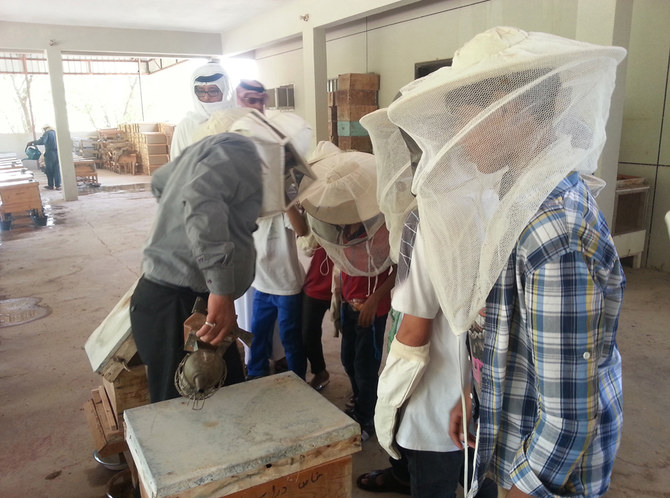
Saudis participate in a summer beekeeping training in Al-Baha province. (SPA file photo)
Through the Sustainable Rural Agricultural Development Program, chartered by the UN Food and Agriculture Organization and the Kingdom’s Ministry of Environment, Water and Agriculture, more than 100 local beekeepers were recently trained on honeybee queen-rearing techniques, prompted by the declining number of honeybee colonies.
Just five years ago, Norah Shawi Al-Shimmari was the only woman known to be working in the beekeeping industry in Saudi Arabia. Now, thanks to training schemes like these, many more women are taking up the craft and prospering as a result.
It has not been without its obstacles, however. “My biggest challenge is getting from one place to another and needing someone to drive me to faraway places,” Al-Shimmari told Arab News.

“I need a guardian and a car and someone to carry things with me as well. My work the past period has been without help. I myself am lifting, housing the bees and sorting the honey, which is very difficult.”
At first, Al-Shimmari would only produce honey under the brand name Al-Shawi Apiaries, named after her late father. After some training to utilize beeswax for beauty, nutritional and medicinal items, she soon expanded her line of projects and made the brand her own.
This led her to suggest ways to work with other beekeepers to create a sustainable economic ecosystem for honey products, like collecting leftover wax and using it to create other products instead of leaving it to waste.
Through perseverance, self-taught Al-Shimmari became the first female beekeeper in the north of the Kingdom and the only woman among 33 beekeepers who took part in the 2021 Hail Honey Festival in early November, where she was dubbed the “Beekeeper of the North.”
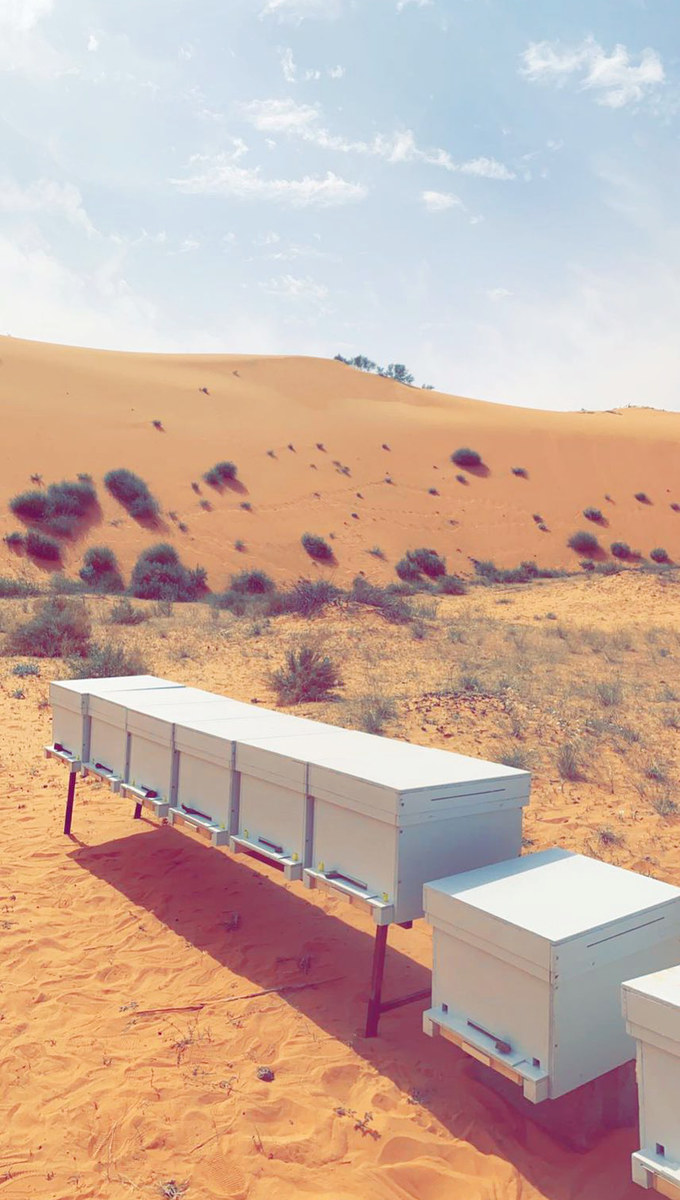
Since launching her beekeeping career four years ago, Norah Shawi Al-Shimmari has found sweet success and been dubbed the “Beekeeper of the North.” (Supplied)
Seeing her work, the emir of Hail Region arranged for a training workshop to take place. More than 40 women have since graduated from this program to become beekeepers themselves. “Now, the Hail region hosts 43 female beekeepers,” said Al-Shimmari.
“Some of them left the field, and some faced impediments or situations that wouldn’t allow them to continue, but some of them are still persevering … my advice for any woman who sees themselves in the field is to pursue the profession.”
There are similar stories across the Kingdom. Hailing from Jeddah, Saudi couple Ahmed Badghaish and Nada Khaled Malaika began their beekeeping journey two decades ago with nothing more than a passion for nature and an innate curiosity about the world of bees.
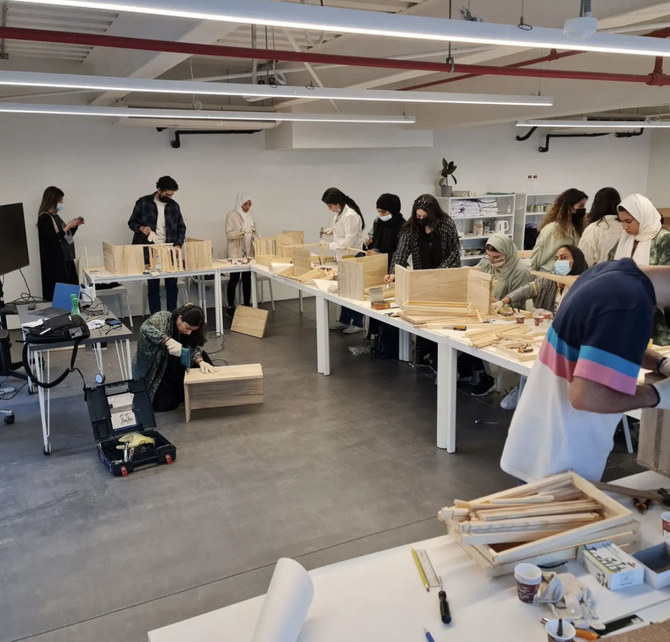
A group of beekeeping enthusiasts learn to make hive boxes during a workshop in Jeddah, conducted by honey entrepreneur Ahmed Badgahish. (Instagram @beewaysaudi)
Over the years, they have transformed a modest business into a thriving apiary named Bee Ways that houses 1,200 beehives, and their products have won multiple international awards.
For small, local producers like Al-Shimmari, however, the profession is a true labor of love.
“After a long seasonal journey, production and transportation, the big achievement after sorting the honey and seeing the product is such a pleasure. This is what drives me to continue improving and thriving in this field,” she said.
“My biggest supporter, after God and my family, was the Ministry of Environment, Water and Agriculture. They stood behind me and opened up opportunities in festivals. I’m always the first to get their invitations.”
ALSO READ:
• Saudi mother-of-six finds sweet success with her ‘kingdom of bees’
• Run by a Saudi couple, Bee Ways travels all over the Kingdom in search of greenest pastures
• Beehives of Saudi Arabia’s Maysan believed to be over 1,000 years old
Despite the challenges, the honey and beekeeping industry is on a steady rise with continuous support from government entities.
Since 2020, about SR140 million ($37.3 million) in funding has been distributed to 10,584 beneficiaries through the Sustainable Agricultural Rural Development Program — Saudi Reef — according to the Saudi Press Agency.
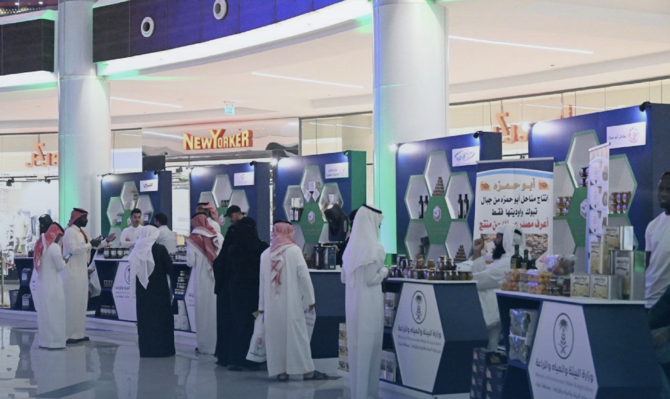
The Honey and Agricultural Products Festival in Saudi Arabia's northwestern province of Tabuk puts the focus firmly on the role of beekeepers. (X: @MEWA_KSA)
On World Bee Day, marked each year on May 20, the Ministry of Environment, Water and Agriculture announced that honey production had reached 5,000 tons annually. It aims to increase this to 7,500 tons by 2026 and achieve self-sufficiency.
There are now more than 20,000 ministry-registered beekeepers across the Kingdom.



































